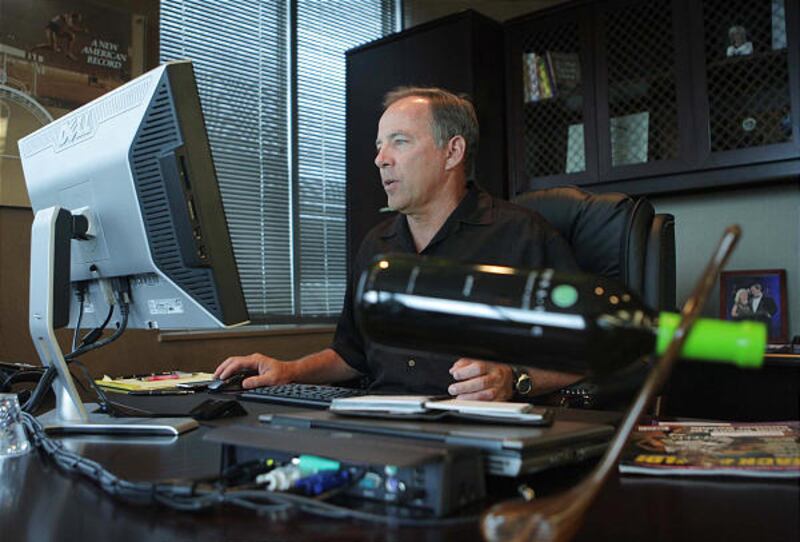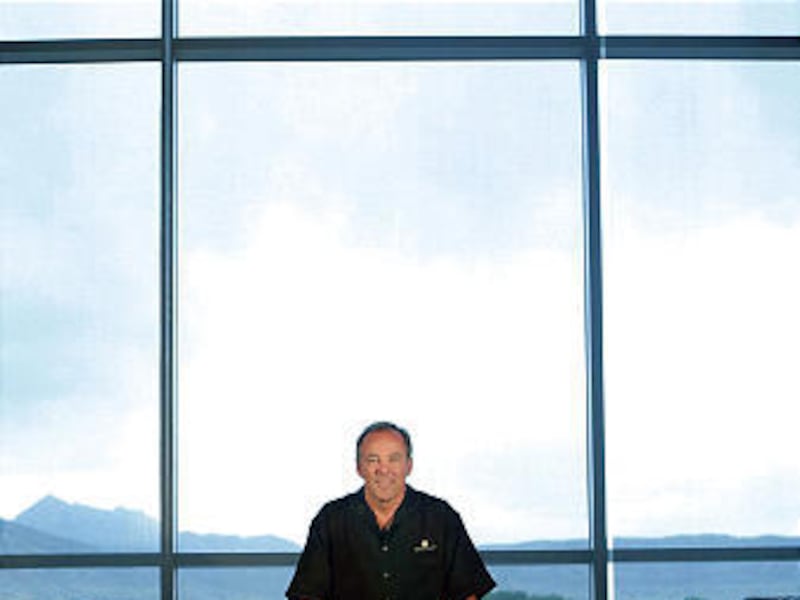He's a full-time businessman now, but the wall of Henry Marsh's office offers the first hint of another life. There's a large photo of a man leaping over a water barrier in a track and field meet in Berlin. It's a younger, slimmer Marsh en route to setting an American record in the 3,000-meter steeplechase in 1983.
It's been 20 years since he ran his last race, but with the arrival of another Olympics, Marsh, a four-time Olympic distance runner, muses on the connection of careers.
"Athletics prepared me for this," he says in his office. "I haven't encountered any situation in business that even comes close to the pressure and stress you experience at the Olympics. I've been through the refiner's fire."
Welcome to the second half of Marsh's life. Now 54, Marsh is co-founder and executive vice president of MonaVie, a wildly successful multilevel marketing company that sells a health juice consisting largely of an exotic berry from South America.
Marsh, a 10-time U.S. champion, famously never captured the gold medal on the track in Olympic and world championship competition thanks to a luckless series of ill-timed boycotts, falls and viruses, but much of what he's dabbled in since then has turned to gold.
Only 3 1/2 years ago, Marsh and three other MonaVie co-founders — Dallin Larsen, Randy Larsen and Charlie Brink — were working out of their basements to start the company. Marsh mortgaged his home, sold property and borrowed money from neighbors and friends to finance the venture.
Since then, the company claims it has made cumulative sales of $1 billion and reached six countries. MonaVie has expanded from home basements to a corner of one floor in a leased building in Sandy, to four spacious floors of the same building.
"It's a fairy tale," says Marsh. "Really, sometimes I have to pinch myself and ask, 'Is this really happening?'"
For Marsh, it was a gutsy move, gambling so much on a berry juice, but he has demonstrated a willingness to take chances throughout a remarkably varied professional career. He took a law degree — paid for by Nike, his running club — at the height of his running career, but he practiced law only briefly.
He worked for Parsons, Behle & Latimer, a Salt Lake-based law firm, for 3 1/2 years before deciding a law career wasn't for him. He worked as a sportscaster for KSL-TV for 18 months before deciding that business "had no future." He started Athletes Unlimited, which managed and represented so called "amateur" athletes during the last days of amateurism, but after 18 months he moved on again.
In 1987, he became the national program director for Franklin International (later Franklin Covey). He developed a principle-based curriculum for the company's time-management and wellness seminars and hit the speaker's circuit. He put those principles in a book called "The Breakthrough Factor," which was written by Deseret News columnist Lee Benson. With equity in the company, Marsh earned a healthy living. His one big splurge: A large two-story luxury home with a tennis court, indoor basketball court, workout room and theater on two acres that overlook the Great Salt Lake and the Bountiful Temple.
From the outset of his business career, Marsh had been dissatisfied with working for others, which is the primary reason he bailed out of his law career. "The only time you make money is while you're working," he said. "The people who make money are those who leverage themselves, who earn money while they're sleeping."
In 2003 he left Franklin and struck up a partnership with Dallin Larsen, who had worked nine years as sales manager for USANA, the giant multilevel nutritional-supplement business. They started Monarch Health Sciences, a comprehensive multilevel weight-loss business that provided products, coaching, fitness programs and staff scientists. About a year later, they abandoned the project and turned to the booming health juice business, a la XanGo and Tahitian-Noni.
"It was hard for people to change their lifestyles," says Marsh of the scrapped weight-loss venture.
Marsh and Larsen already had their multilevel Monarch business in place to sell the juice. The MonaVie concoction became a mix of 19 fruits, but acai was clearly the star attraction in the drink. The deep purple berry grows at the top of palm trees in the Amazon region. It is touted as a health drink with numerous benefits — it is believed that it boosts energy, aids mental clarity, digestion and libido, reduces arthritis pain and the effects of aging on skin, strengthens the immune system, etc., etc. Most often it is touted as easily the richest food source of antioxidants, which are thought to combat cancer-causing free radicals in the body.
The benefits are open to debate, but certainly the MonaVie product has its fans. MonaVie ("the tree of life" in Portuguese) claims that it signs up 10,000 new distributors per week, totaling more than 1 million who have paid the $39 for the right to sell the product and buy it wholesale.
Marsh spends most of his work hours talking to or meeting with distributors and potential distributors. Larsen likes to introduce him as "our resident four-time Olympian." Says Larsen: "Everybody likes to hear from a four-time Olympian. Henry has a way of keeping everything light. Everybody loves Henry. If there's disagreement in a meeting, he can lighten it up. He's competitive but not overly aggressive."
"It's a phenomenal success story," Marsh says, as he takes a guest on a tour of the MonaVie headquarters and introduces him to various employees, which includes three of his four children from his first marriage — Jimmy, Andrew and Lauren.
Marsh says MonaVie has tried to maintain a low profile, but recently it has begun to receive attention from the national press, most notably Newsweek, and with it has come the usual detractors of multilevel businesses.
Newsweek reported that only 1 percent of MonaVie's distributors make money; Marsh says it's more like 14 percent.
"I know we've paid out hundreds of millions of dollars in commissions," says Larsen.
Marsh is clearly irritated by such issues, but he knows it comes with the multilevel territory. As he wanders the company's spacious headquarters, he wants most to talk about charity work the company is performing in Brazil, home of acai and the place where Marsh served a church mission 25 years ago.
They have chosen to focus their efforts on one of the many slum areas of the country, an area so rough that before MonaVie representatives visit the area to perform charitable work an advance party has to get permission from local drug lords. MonaVie provides education, food and medical care for 165 children in the area, and there's a long waiting list of other children who want to participate. MonaVie also funds a school to teach job skills to adults and is building MonaVie Village to provide housing for homeless orphans.
"It's so overwhelming," says Marsh. "There is such a need and you feel so inadequate. It's like the story of the kid who is throwing starfish into the ocean — you don't make much of a difference, but you do make a difference for those few. We want to give back to the country that's giving us so much. Mostly, American companies go into a country, and all they do is take."
Marsh, who has adopted two children with his second wife, Rozanne, including a high-functioning autistic child, also helps sponsor a family foundation in Utah that purchased a building to house the Spectrum Academy for autistic children.
"I don't know how religious you want to get here, but I feel like there's a reason for this," he says, as he looks around MonaVie headquarters. "I feel like I can do a lot of good."
E-mail: drob@desnews.com



